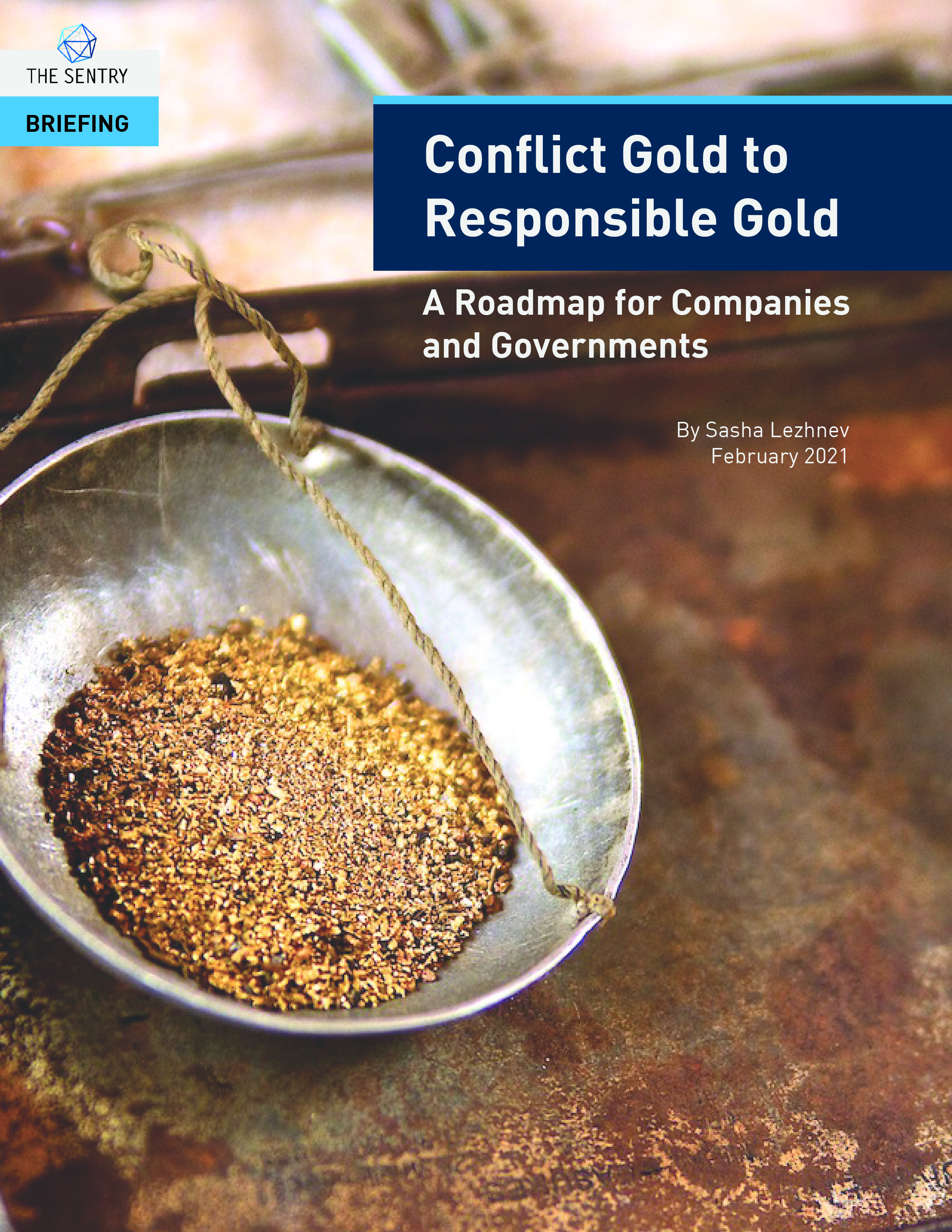 Read the full briefing
Read the full briefing
> اقرأ ملخص وتوصيات المقال بالعربية
> Lire en français
The technology, jewelry, financial, and automotive sectors are increasingly at risk of purchasing gold via Dubai that benefits armed groups responsible for mass atrocities in multiple countries in East and Central Africa. Five main policy issues continue to incentivize the conflict gold trade and disincentivize the responsible artisanal trade, presenting key opportunities for action by governments, companies, and banks.
Gold’s meteoric rise in price has brought renewed attention to the problem of conflict gold—gold that funds armed groups and criminal networks. Over $4 billion in conflict-affected or high-risk gold from Central and East Africa flows to international markets annually,* * including to the United States, India, the Middle East, Europe, and China.* * * Electronics, jewelry, automotive, and financial services companies are at risk of purchasing conflict and high-risk gold from the Democratic Republic of Congo (DRC), the Central African Republic (CAR), Sudan, and South Sudan via Dubai, United Arab Emirates (UAE). Gold from these conflict-affected countries is primarily smuggled to neighboring countries—namely Uganda, Rwanda, Cameroon, Kenya, Chad, and Burundi—and then exported to Dubai before ending up in jewelry or gold bars around the world.* * * *
For more on this topic, read our
conflict gold advisory
Meanwhile, a nascent trade in responsible, conflict-free artisanal gold is emerging from East and Central Africa, but it needs significant regional and international policy changes and industry engagement in order to grow. Hundreds of thousands of men and women work in artisanal and small-scale gold mining (ASM) in East and Central Africa, but they are frequently exploited by corrupt officials, criminal traders, armed units, and poor policies. COVID-19 has left artisanal mining communities in the region even more vulnerable to price and criminal exploitation.* *
International regulations, due diligence standards, and industry auditing programs established over the past decade to combat the conflict gold trade have significantly improved awareness of the problem. However, there are five main obstacles to a sustainable solution, presenting new opportunities for governments and industry to have an impact.
- Lack of consequences. Refiners and traders who deal in conflict gold have faced few, if any, financial or legal consequences for contributing to armed conflict or pillaging, despite United States, United Nations (UN), and European Union (EU) sanctions regimes, industry auditing programs, and laws that address these issues.
- Weak policies and enforcement in Dubai and other world gold centers. Policies on gold trading and customs in the UAE, India, and other global gold centers are inconsistent and insufficiently enforced, which incentivizes smuggling and money laundering. The new London Bullion Market Association (LBMA) international bullion center initiative, which threatens to cut off gold centers from global supply chains if they do not enact key responsible gold reforms, provides useful leverage to try to change those policies.* *
- Imbalanced gold export taxes. Gold export taxes among gold-producing states and neighboring countries in East and Central Africa are severely imbalanced, significantly incentivizing smuggling. For example, Uganda and Cameroon have substantially lower gold taxes than neighboring DRC and CAR, respectively, thus making it much more profitable to smuggle gold to those countries.
- Policy disincentives. Policies in the region hinder or completely preclude miners’ ability to register legally, secure property rights, or have protection, creating major obstacles to developing the responsible artisanal mining sector. Government corruption exacerbates those challenges.
- Lack of financing. Financing for responsible, conflict-free mining in East and Central Africa is severely lacking, making mining cooperatives vulnerable to illicit actors who provide prefinancing.
Main recommendations
The trade in conflict gold is prolific and problematic, but companies, governments, and financial institutions can pursue the following five actions to have significant impact:
- Establish greater consequences for trading in conflict gold. The United States, the UN Security Council (UNSC), and the EU should investigate and, if appropriate, sanction refining and trading companies that deal in conflict gold. Jewelry and electronics companies should stop sourcing from refiners that have failed credible independent audits on conflict minerals. Such policies have helped clean up the trade in other conflict minerals.
- Strengthen policies and enforcement in Dubai. The UAE government should close the regulatory and enforcement loopholes that allow for trade in conflict and high-risk gold, in line with LBMA and Financial Action Task Force (FATF) recommendations.
- Harmonize gold export taxes. The US Department of State and the EU should work with regional governments—in Uganda, Rwanda, the DRC, CAR, and Cameroon, in particular—to harmonize gold taxes in order to reduce smuggling and facilitate growth in the conflict-free gold trade.
- Remove disincentives for artisanal miners. Donor governments should work with mining ministries in reforming policies to formalize artisanal mining, for instance, by reducing the red tape for miners to access property rights and by lowering miner registration costs. Governments in the region and gold refiners should adopt the CRAFT code,* a standard for improving artisanal mining conditions.
- Source from conflict-free artisanal mines. Refiners that have passed credible international audits should increase sourcing from responsible artisanal gold projects in the region. Pilot projects to source responsible gold from the DRC to Western markets should be scaled up.
Read the full briefing.

